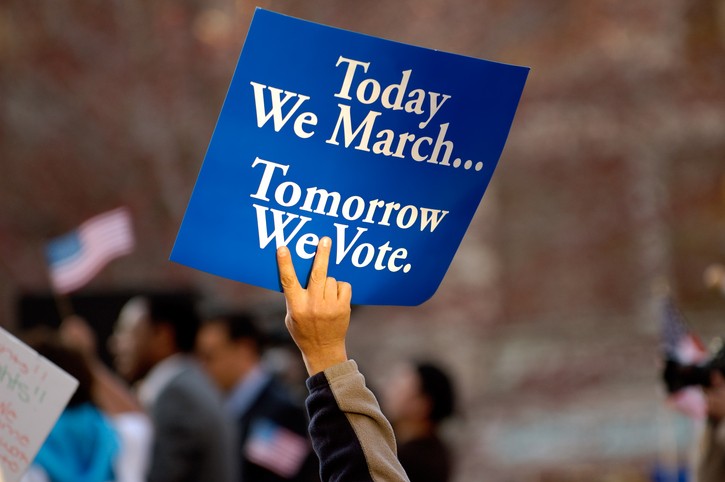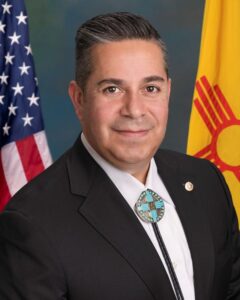October 3, 2023
The Importance of Hispanic-American Advocacy in the Fight for Voting Equality
U.S. Senator for New Mexico

As kids head back to school this fall, the weather cools, and we look ahead to Thanksgiving and the holiday season, many Americans are preparing for a different fall tradition.
Hispanic Heritage Month is a time to reflect on and celebrate the history, culture, and achievements of Hispanic Americans from every corner of our country. And like many Americans, Hispanics played a pivotal role in the nation’s fight for equality at the ballot box.
The Voting Rights Act (VRA) of 1965 is considered a landmark bill, and understandably so. The VRA is credited with helping dismantle the Jim Crow policies throughout the American South, and ushering in hundreds of candidates of color to better reflect America.
Many people may not know about the advocacy of Hispanics, Latinos, and Chicanos in passing important reforms in the 1975 VRA extension. A month before President Ford signed the updated VRA, officers from the Texas Alcoholic Beverage Commission brutally beat farmer and activist Modesto Rodriquez as he stood outside a bar attempting to recruit Chicanos to testify about voting discrimination.
Hispanic and Latino activists joined forces with Black legislators, notably Barbara Jordan, the first Black woman elected from the South to Congress, to push for provisions that would break down barriers for Spanish-speakers at the ballot box. The reforms, passed in 1975, required states and localities to provide non-English ballots and voting materials in states and localities where significant numbers of non-English speaking Americans lived.
Ten years after the passage of the 1975 Voting Rights Act reforms, the number of Mexican-Americans holding county and municipal offices in Texas increased from 353 to 559. In 1977, Congress counted just seven Hispanic members, today there are 62.
Perhaps no one embodies the rise of Latinos in politics more than my friend and mentor, the late Bill Richardson. Governor Richardson was the first Latino to run for the Democratic nomination for president, among many other prestigious positions he held over his career. During his two terms as New Mexico’s governor, he was the only Latino governor in the country. Governor Richardson also spent 14 years serving in Congress, and it was my honor to later be elected to the same House seat in 2008.
Today, Latinos and Hispanics are the second largest voting bloc in the country. In 2020, Latinos cast 16.6 million votes in 2020, an increase of 30.9% from 2016. The 2020 election marked the first time in history when over 50 percent of eligible Latinos cast a vote. Despite these gains, voter suppression laws, aimed at depressing the Hispanic and Latino vote, persist in states such as Arizona and Texas.
And just like in 1975, voting rights activists of today are pushing back. Here in Congress, Democrats introduced the John Lewis Voting Rights Act, legislation that would, among other things, require jurisdictions with high rates of non-English speakers to seek pre-approval from the Department of Justice before changing language assistance voter materials.
In my home state of New Mexico, lawmakers recently passed the New Mexico Voting Rights Act. The bill will automatically register voters at the Motor Vehicle Department, allow for same-day registration, mandate two ballot drop boxes per county, and restore voting rights of previously incarcerated individuals upon release. I believe in these provisions and I think they will make it easier for all New Mexicans to cast a ballot.
So, as we spend this month celebrating and reflecting the enormous achievements of Hispanics, we should remember individuals like Modesto Rodriguez, who even in the face of severe brutality, fought for the rights of his community. We should celebrate the giants of public service like Bill Richardson, who has left behind a great legacy for the next generation of Latino leaders. I encourage all the young Hispanics and Latinos who are fighting for immigration reform, racial justice, and a clean energy economy, to not give up. We will never live in a true democracy until every single American is able to make their voice heard.
_________________
 Senator Ben Ray Luján has served as the junior United States Senator for New Mexico since 2021.
Senator Ben Ray Luján has served as the junior United States Senator for New Mexico since 2021.
Democracy and Elections, Democracy and Voting, Equality and Liberty, Voting Rights




